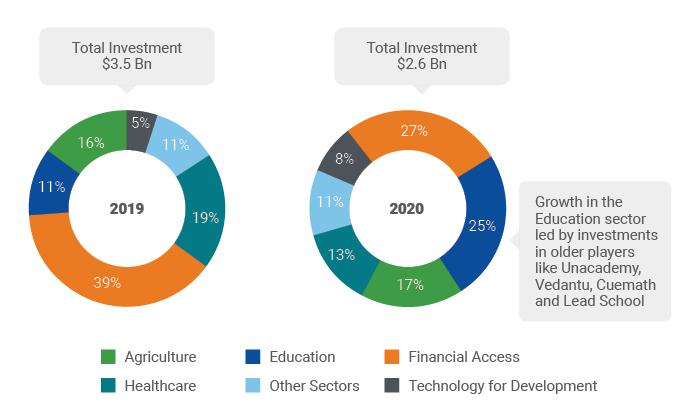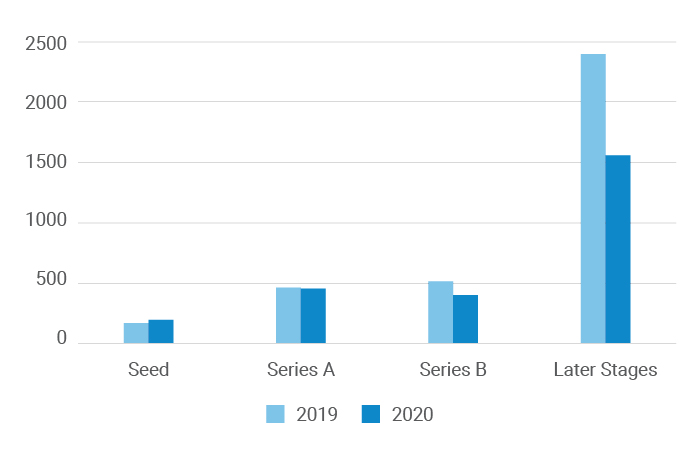2020 in Retrospect
Impact enterprises received ~$2.6BN in investment across 243 equity deals and saw 13 successful exits in the calendar year (CY) 20201&2. Despite the global health pandemic and its accompanying effects on the business and economic environment, impact investors continue to pledge their support to solving critical social and environmental challenges through investments in scalable, tech-based, innovative social enterprises.
Key investment trends in 2020 were as follows:
- Overall, impact investing volumes fell but there is increased interest in Early-Stage Enterprises. While overall impact investments in CY 2020 fell 25% vis a vis CY 2019, the sector also witnessed a ~16% rise in seed stage investment volume reflecting the interest in the sector despite the pandemic. Investors were most keen to back early-stage enterprises in agriculture, livelihoods and healthcare sector.
- Big-Bang year for the Education Sector: 2020 was a ‘big-bang year for the education sector attracting investments totaling ~$660Mn across 47 deals, with online test prep and K10 segments leading the way. While the national lockdowns wreaked havoc for the traditional modes of education, there was a dire and urgent need for remote tech-based solutions ‘to keep the flow of knowledge running to 335 million students enrolled in the country’. This crisis created an opportunity for existing ed-tech platforms. The sector performed substantially better than 2019, with 65% Y-o-Y growth in investment volumes and ~20% rise in number of deals.
- Investors back early-stage health enterprises: Albeit an overall fall of ~70% in investment volume versus 2019, investors are actively investing in early-stage healthcare enterprises focused on telemedicine, AI based solutions, cloud enabled diagnostic tests, in 2020. There was a ~85% rise in number of seed stage deals3 across healthcare segments in 2020.
- Tech-Based business models attracted greater investor attention: Technology adoption has leapfrogged years and opened up exciting opportunities for impact start-ups’ specifically in agriculture, education and healthcare. Investors were also quick to put their money into SME Tech solutions that addressed the urgent demand for digitization to enhance efficiency of SME businesses. Early-stage innovative tech-based enterprises catering to the SME sector, actually observed a 7-times increase in investment volume in 2020 ($51 Mn in 2020 vs $ 6 Mn in 2019)
- Degrowth in Late-Stage Financial Inclusion related busines models: Expectedly, investments related to financial access faced the maximum impact during the year given the uncertainty around the creditworthiness of customers and the lack of demand for loans. While interest in non-lending financial models (payments/insurance solutions etc.) remained robust, the sector witnessed a 35 % fall in investments in late-stage enterprises in the financial access sector: this accounted for a bulk of the overall de-growth in the impact sector vis-à-vis last year.
- Contribution to UN Sustainable development goals: Impact investing has contributed towards 11 of the 17 Sustainable Development Goals and enterprises focused on SDG 5 (Gender Equality) and SDG 9 (Industry, Innovation and Infrastructure) received the highest volume of investments in 2020. This is consistent with our research from investment analysis for previous years.
 Figure 1: Represents Volume (in %) of Investments across sectors for 2019 & 2020. Source: IIC
Figure 1: Represents Volume (in %) of Investments across sectors for 2019 & 2020. Source: IICThe fall in investments in 2020 (versus 2019) is primarily on account of fall in later stage investment volumes in the healthcare and financial access sectors. There was a 16% rise in investment volumes at the seed stage.
 Figure 2: Represents volume of deals (in %) across stages for 2019 & 2020. Source: IIC
Figure 2: Represents volume of deals (in %) across stages for 2019 & 2020. Source: IICFor more details, read our report ‘2020 in Retrospect’ releasing soon.